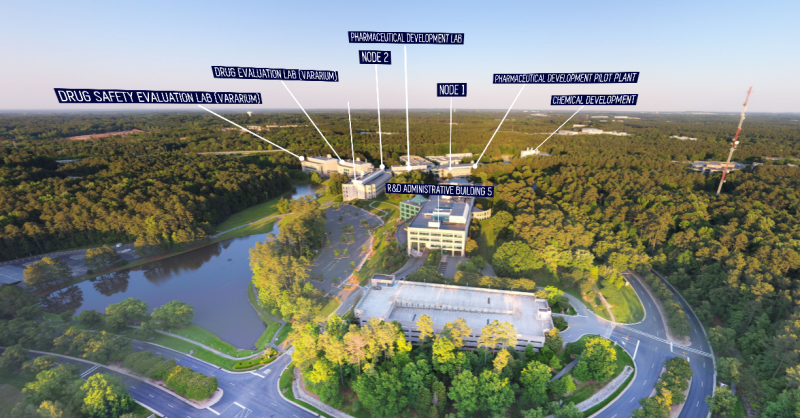
By Mindy Hamlin, NCBiotech writer — June 19, 2020
RESEARCH TRIANGLE PARK – Duke University’s School of Medicine research arm is building on its recent success in acquiring grants for immunology, infectious diseases and clinical trials with a move to Research Triangle Park.
On the heels of federal grants and contracts totaling nearly $600 million, the school has leased 273,000 square feet that will be retrofitted in the Parmer RTP research and development campus.
“Duke has been incredibly successful in increasing its research portfolio,” said Thomas Denny, associate dean for Duke RTP administration. “When you do that, you need space. It takes a long time to build buildings, so we found buildings we can retrofit to support our research. If you don’t have the needed space, you can’t ramp up the overall effort.”
With the opening of the Duke RTP facility, the medical school will expand its focus on the development and clinical testing of vaccines from a variety of investigators. One of the Duke teams to relocate to RTP are members of the Duke Human Vaccine Institute (DHVI) who are leading programs to develop new influenza vaccines as well as clinical trials to test new influenza and potential COVID-19 vaccines.
“The idea is that we will build a campus that has a theme of immunology, infectious disease and emerging pathogens and develop counter measures to them, such as vaccines and antibodies,” explained Denny.Get the top stories in your
The federal partnerships with Duke underscore North Carolina’s leadership in the field of vaccine development.
“For many years, Duke University Medical School has been growing its profile as a key leader in vaccine development,” said Mary Beth Thomas, PhD, senior vice president, science and business development, at NCBiotech. “Having developed broad capabilities in vaccine development from research and development through manufacturing and testing, DHVI has become a significant asset to the region’s thriving life science industry.”
FEDERAL CONTRACTS SEEK NEW INFLUENZA VACCINE
Last fall, the National Institute of Allergy and Infectious Disease (NIAID) awarded DHVI three research contracts as part of the Collaborative Influenza Vaccine Innovation Centers (CIVICS) initiative to develop a longer-lasting, more broadly protective vaccine to replace the seasonal flu shot.
The CIVICS program aims to improve the durability of seasonal influenza vaccines and develop a universal influenza vaccine through iterative vaccine design, manufacturing and early phase clinical trials.
“The goal is to develop a vaccine that protects against all strains of the flu, such as H1N1 and Avian flu,” said Denny. “The second thing we would love to get out of this is the development of a vaccine that will last longer than one year. If you do not have to give the vaccine to everyone every year, you start to get broad coverage and protection.”
Eight years ago, Duke launched its own manufacturing facility that meets good manufacturing standards, or GMP, essential for producing vaccine products used in proof-of-concept Phase I clinical trials. The manufacturing facility will remain at the university’s main campus in Durham. To date, the facility has manufactured three vaccines.
If the options on all three NIAID contracts are exercised, total funding for Duke researchers could reach up to $420 million over seven years.
HIV VACCINE SPURS INVESTMENT
In addition to the CIVICS program, NIAID is also funding the university’s work on the development of an HIV vaccine.
While the university seeks partnerships during the clinical trial process, much of the manufacturing and testing is first done at DHVI to allow researchers to conduct small clinical trials before moving into larger trials often preferred by contract management organizations (CMOs).
“Within the field of HIV, we have spent many years searching for a preventative vaccine,” explained Denny. “We need to do proof of concept protocols, which a lot of businesses don’t do. Our approach is to do small trials, so we are manufacturing for fewer numbers. It is an iterative process, and, once we get a hit, we go for a larger trial.”
It is at this point that DHVI begins partnering with CMOs that traditionally conduct the larger clinical trials.
Over seven years, the NIAID programs Denny oversees will bring in $89 million research dollars to RTP.
Denny expects the full move to the Parmer RTP campus to take approximately two years. The CIVICS and HIV research teams will be the first to move into the new facilities at the beginning of 2021. When Duke researchers from the Departments of Surgery, Medicine and Immunology complete the move to Parmer, the School of Medicine will have 200 to 250 employees at the new facility.